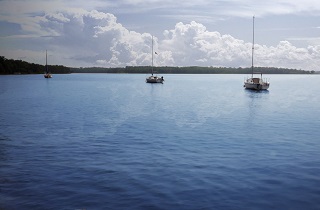Today is World Oceans Day, a global celebration of the oceans, and a good opportunity to highlight how Canada’s East Coast is set to accelerate innovation and economic growth in the ocean technology sector, writes EDC’s Regional Vice-President of Atlantic Canada Edward Steeves.
Canada has the longest coastline and the fourth largest ocean territory in the world, with three bordering oceans. When it comes to ocean resources, we have a lot to offer. But when you think about ocean exports in Canada, you may think first about our delicious seafood. Tourists flock to the East Coast every summer to get a taste of it. When they can’t make it here, we send it to them. Fisheries products are Canada’s largest food commodity export—we shipped $6.9 billion worth of products in 2017 to 137 countries. But Canada has even more to offer than our beloved lobster, snow crab and salmon. We’re also a leader in the ocean technology sector, one that’s growing rapidly.
In 2010, The Organization of Economic Cooperation and Development (OECD) valued the ocean’s economy to be worth $1.5 trillion USD. They’ve projected it will grow to $3 trillion USD by 2030. Our country is poised to be a large part of that growth, especially with adequate funding and support.
My office overlooks the Halifax Harbour, one of the largest harbours in the world, and the research home to several ocean technology companies. As part of my job I get to meet and speak with companies who are researching, developing and creating innovative technology that contributes to the ocean economy. In Nova Scotia alone, there are more than 300 businesses in the oceans-sector business. Sixty of them are high tech companies focused on cutting-edge research and development of products that already have a demand in 90 countries around the world. The industry accounts for one-third of total research and development among Nova Scotia businesses.
These firms are developing products and services that are critical to multiple ocean industries, like marine remote sensing technologies and ocean observing systems. Canada is a world leader in this space, particularly in radar and acoustic sensors, information systems, robotics, underwater vehicles, and simulation, training and communications, like Nova Scotia’s Survival Systems Limited. It’s an industry that is very collaborative, relying on shared resources for research, support and guidance. Backed by government funding, the industry is set for more rapid growth.
In 2017, the federal government announced the creation of an innovation program alongside private companies that will provide funding to high growth sectors in Canada. The Ocean Supercluster was awarded a portion of that funding in February 2018. Based in Atlantic Canada, the Ocean Supercluster is comprised of universities, businesses, government entities and indigenous groups that will focus on industrial, technical and scientific innovation for the ocean economy. Over 10 years, it’s expected to have an impact of more than $14 billion on GDP and create more than 3,000 jobs.
The goal is to make a positive impact on the economy. But the supercluster is also organized to be sustainable and environmentally sound, with the goal to develop talent and improve the supply chain as it grows.
Proximity to the Atlantic Ocean isn’t the only reason the Ocean Supercluster is based here. Atlantic Canada boasts a lot of expertise within a small geographic region. Nova Scotia has one of the highest concentrations of ocean-related PhDs. The Bedford Institute of Oceanography, Canada’s largest centre for ocean research, is home to over 600 experts, including scientists, engineers and technicians. Dalhousie University has Canada’s only Bachelor’s degree in Ocean Sciences and several ocean-related graduate programs.
Another unique aspect of Atlantic Canada is the Centre for Ocean Ventures & Entrepreneurship (COVE). Located in Halifax, it’s an ocean-tech coworking space of sorts, where ocean experts, academics and business can collaborate on ideas and have them come to life. There’s even an on-site incubator for start-ups called the Start-Up Yard.
The Ocean Technology Council of Nova Scotia, Nova Scotia Business Inc. and The Coastal and Ocean Information Network Atlantic are also great resources that offer support to ocean technology businesses here.
One of the key things I’ve learned when dealing with ocean technology companies is that they’re keen to export. In many cases, these firms sell abroad from day one. With that international challenge in mind, they need support. One of their biggest concerns is making sure they get paid. Because they’re working on innovative products and services, these firms need financial support during the early development and commercialization of their products.
I often suggest EDC credit insurance to help mitigate the risk of non-payment. With their accounts receivable insured, firms I deal with feel more comfortable extending credit to their buyers overseas. This not only makes them more competitive, but they can feel confident they'll get paid even if there's turbulence in global markets. Our Export Guarantee Program helps them access working capital, which means they can grow faster and take opportunities as they arise. And when these companies succeed, it’s better for the health of our oceans—and our famous Atlantic Canada lobster.







